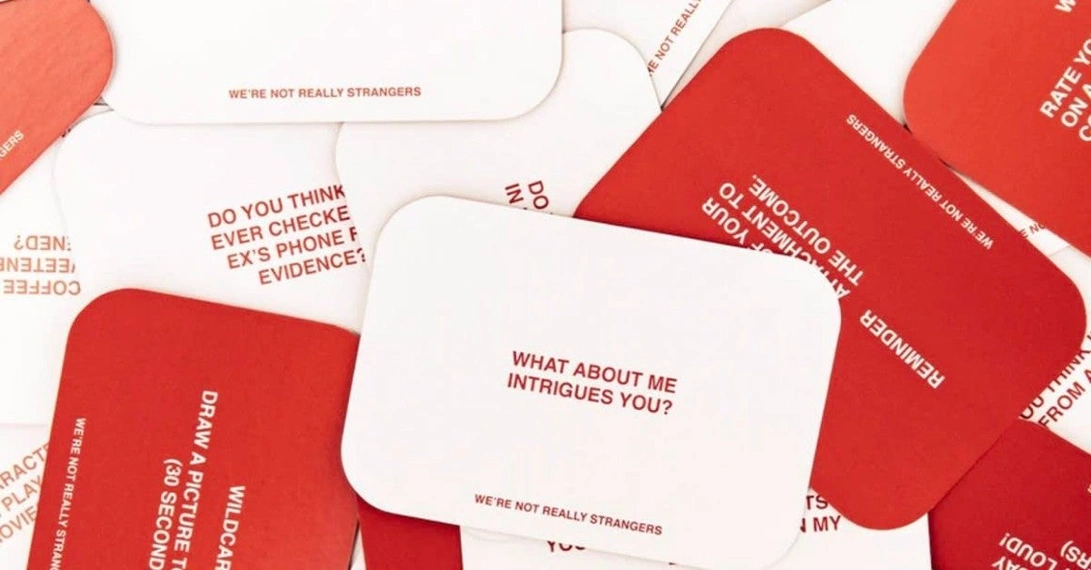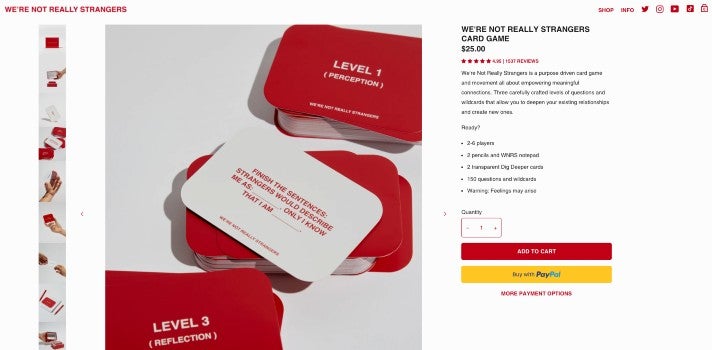
From Instagram to TikTok, the most successful types of brands are beauty and fashion, where products lend themselves to visually appealing content that regularly amasses followers in the millions. An outlier on TT, however, is card game “We’re Not Really Strangers.” What’s more: the way WNRS uses TT could be replicable for other unknown brands with enigmatic products. Today, we’re retracing the steps that helped this one-women company based in L.A. generate over 3 million followers on TikTok—and how it’s impacted overall sales for the card game.
A quick glance at the “We’re Not Really Strangers” profile on TikTok tells you all you need to know: 3 million followers, likes in excess of 90 million—and that’s before we get to the most important metric on TikTok. Every WNRS video comes close to 150k views, with top-performers cracking 4 million. In total, the profile has notched 336 million views, according to Nextbrand. For context: that’s on the order of Kylie Cosmetics—with nothing more than a simple card game as its product.
What’s the game?
Interestingly, the point of “We’re Not Really Strangers” is not to win. It’s reminiscent of a more profound version of “Truth or Dare” minus the dares, where the object is for players to deepen their knowledge of and thus their relationship to one another. The game is split into three levels, perception, connection and reflection. Perception consists of questions that ask about what one player thinks about the other, e.g. “Do you think I’ve been in love before?” and “What does my style say about me?” Connection has players probe each other’s emotions more deeply with questions about themselves, such as “What was the last lie you told your mother?” and “What do you feel your most important character trait is?”

The majority of “We’re Not Really Strangers” games are sold through its online shop
The bulk of WNRS sales come via the official shop
That brings us to the final level, Reflection. Here questions are phrased as open-ended questions designed to start a dialogue about the person asking the question, e.g. “What you think about my strengths?” and “What things could we achieve together?” The final card prompts players to write each other a hand-written note that is not to be read until the game has concluded. The small team behind WNRS, including 25-year-old founder and CEO Koreen Odiney, has since released several expansion sets specifically on relationships, breakups, dating, loving self and privileges. The core games is sold for 25 bucks and each expansion costs an additional 12 dollars. When the pandemic first hit last year, WNRS benefitted from some prominent support: Hailey Bieber played the game live on Instagram to her 34 million followers (as of today). Scores followed suit shortly thereafter, but the primary growth drivers for the WNRS accounts on Instagram and TikTok is self-made content.
Guerilla marketing on inexpensive content
WNRS VP of digital and eCommerce Jessica Potts said that the company’s content strategy on social “reflects what we do in the core game. Like the game itself […] it should feel conversational.” That explains why the company accounts rarely feature updates about the game itself and instead focus on content centered around mental health and self-care, typically statements and questions on the game cards.
By focussing on such content, WNRS can produce cheap content. One TikTok clip with 3.7 million views, for example, shows some simple bedding onto which a shadowy message is projected. A common video trope is where someone in the social media team uses a finger to scribble a message onto a steamed window. Another videos shows the team “tagging” a street with a message or fly posting cards on walls in well-trafficked areas. The combination of Guerilla Marketing strategies and content production has helped WNRS carve out a following for itself on TikTok and Instagram, where it also enjoys 3.7 million followers. Content ideas are both planned out and spontaneous ideas born at midnight and fleshed out within seconds. The part-methodical, part-spontaneous philosophy mirrors, by the way, how Odiney came up with and named the company.
A passionate for photography and an eye for what lies beneath
Since her days in high school in LA, Odiney says she’s always had a camera with her. While working as a model, she’d go from in front of the camera to behind while at the shoot, always asking of her subjects three questions: name, age and passion. One day, she spotted a man reading poetry. She asked her three questions, he answered and as she was walking away said “She would write a book one day, and it would be called, We’re Not Really Strangers.” That random occurrence gave her the company name spontaneously, but it took her another two years of “not knowing what this thing would be and not knowing what to do with it.”
Gamifying getting to know you
After a few additional interactions with strangers helped her further develop the idea, she realized she wanted to gamify the experience and to focus on mental health instead of the product itself. In contrast to other brands who are extremely successful on TikTok, a card game simply does not have the inherrent visual draw of fashion or beauty products. The silver lining here being that because the content works as is, WNRS can forgo partnerships with expensive influencers who are otherwise essential for DTC brands to amass reach on TT. Instead, WNRS’ own Tiktok community plays a role in generating additional awareness, which the company keenly prods by, for example, asking followers to tag someone who reminds them that “Healthy love exists. Remember that.”
With the fact that such mental health and well-being topics are extremely popular during the past year-plus of lockdown, WNRS has built a business around its brand presence. In its online shop there are cell phone cases, hoodies, pants, shirts, greeting cards, breakup and self-reflection kits and even an “emotional hotline” service, where WNRS sends a daily text (SMS) message for $1.99 a month: “Text the first letter of your first love’s name to subscribe. WARNING: Feelings may arise.”
Tiktok boosts sales
“We’re Not Really Strangers” is not the only brand who’s found success on TikTok focussing on a topic instead of a product. It’s obviously easy to say that you just need a product that can go viral like these Tiktok leggins. Last year, we broken down promising ways in which creators and brands gamed the platform’s discovery page and our German colleagues took a detailed look at how product-centered channels could stand out on TT—pro tip: the crazier, more outlandish the product, the better. The core problems facing brands and creators, however, is that TikTokkers are notoriously fickle when it comes to ads and content that do not align with TikTok’s underlying playfulness. One illuminating example of how to mesh products with TikTok’s tiktokkedness is candle startup Homesick, where everything is aimed at getting the most out of your candle, from maximizing burn to avoiding smokiness.
That’s all fine and well, but what impact has the social strategy had on sales when the focus of the social presence is not on the product? Unfortunately, WNRS does not provide any specifics, but Potts did at least state publicly that viral Tiktok videos have had a noticeable impact on game sales with one video accounting for a 950% jump in sales—from one day to the next. That is how you play the game.
























